The Barred Rock chicken is a great egg-laying breed that’s also known for its beautiful feather pattern. You might see these birds referred to as Barred Plymouth Rock chickens because they’re a color variety of the popular Plymouth Rock breed.
So, what does it take to raise and care for Barred Plymouth Rocks? Let’s take a look at their history, personality, and care requirements.
Barred Rock Overview
Before we look at the details of these Plymouth Rock variants, here’s an overview of all their notable traits.
| Lifespan | 10 – 12 years |
| Weight | 6 – 9.5 pounds |
| Appearance | Black and white feather pattern |
| Egg Production | 4 eggs per week, 200 annually |
| Egg Color | Brown |
| Good for Beginners? | Yes |
| Minimum Coop Size | 10 square feet per chicken |
| Price | $2 to $4 per chick |
Are Barred Rock Chickens the Same As Plymouth Rock Chickens?
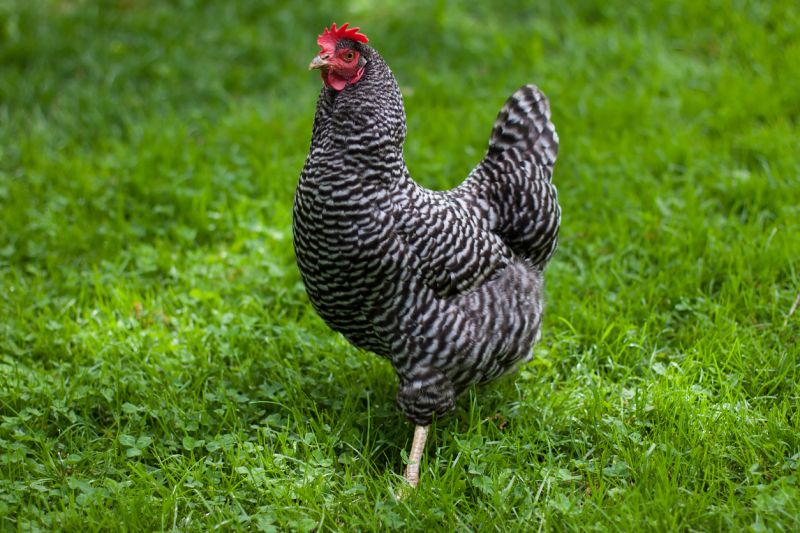
Sort of. These beautiful birds are a color variant of Plymouth Rock chickens. In fact, they’re the most common color, which is barred black and white feathers. These unique feathers are one of the things that make the breed so recognizable.
Some other Plymouth Rock chicken colors include buff, blue, white, and partridge. Plymouth Rocks have the same qualities and care requirements as these birds. So, if you can’t find a Barred Rock to care for, consider a Plymouth Rock instead.
Barred Rock History
Plymouth Rock chickens are one of the oldest chicken breeds. Barred Rocks first made an appearance in the mid-1800s. This breed variant was shown at a show in Boston, Massachusetts, in 1849, but the breed seemed to disappear for a while after that.
A few decades later, barred chickens became more popular. Dominiques and Barred Rocks soon gained popularity for their beautiful barred feather patterns.
Plymouth Rocks eventually became important birds of the broiler industry during World War II. They were crucial for providing meat and eggs to Americans. Today, they’re still popular for both meat and eggs. Their docile temperaments have made them popular backyard chickens for keepers of all experience levels.
Barred Rock Appearance
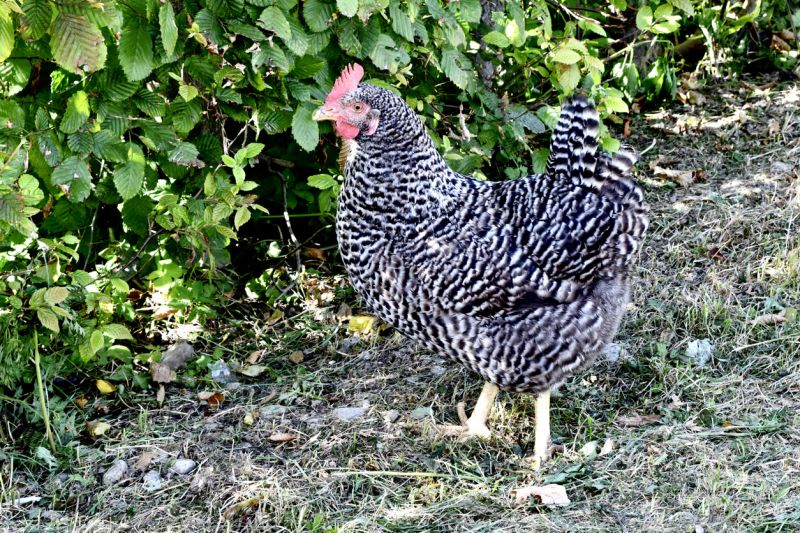
Barred Rocks are beautiful birds, which is why they appeal to so many people. Here’s what they look like at every stage of their lives.
Egg Color
Their eggs are medium to large, and they can be described as light brown or pinkish-brown.
Chick Appearance
Barred Rock chicks have soft, fluffy feathers like most young chickens, but they’re almost completely black with only patches of yellow. As they grow up, the black feathers become lighter, and white patterns begin to appear.
Adult Appearance
Full-grown Barred Rocks have gorgeous feathers with a black-and-white striped pattern. They are large chickens with a triangular-shaped body. Hens usually weight around 7.5 pounds while roosters are a pound or two heavier.
Barred Plymouth Rocks have vivid red combs and faces. They have bright eyes that are usually a light brown color.
Barred Rock Personality
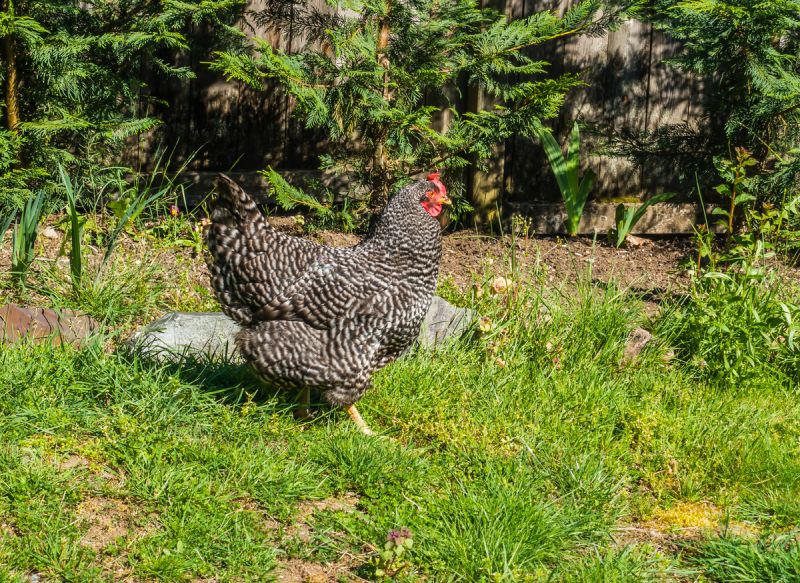
Barred Rocks are known as friendly, docile birds. They’re very adaptable and are known to get along with most humans, even children. They don’t mind getting treats and being handled, so some people even keep them as pets.
Broodiness
Yes, these hens can go broody. The breed was around before modern incubators were made, so they were raised to sit on eggs to incubate them on their own. Not all Barred Rock hens are naturally broody, but they can be persuaded to look after eggs and chicks if needed.
If the hens go broody, they’re more likely to show aggressive behaviors. In that instance, you’ll need to make sure they have lots of extra space from other chickens in the coop.
Noise Levels
If you’re looking for one of the quietest chicken breeds, these birds might be a good fit for you. They’re generally very quiet, so they’re good for keepers who live near their neighbors.
Roosters might make noise if they see a predator, but other than that, they have average noise levels. The hens are known to be quiet, so they’re suitable for a wide variety of habitats.
Do They Get Along with Other Animals?
For the most part, Barred Rocks get along with other animals. Yet, it’s still important to give them lots of space. There should be at least 10 square feet per bird in the coop, and there should only be one rooster for every 10 hens at most. The more space you give your chickens, the less likely they’ll be to fight.
Here are some chicken breeds they can be kept with:
- Silkie
- Speckled Sussex
- Buff Orpington
- Australorp
- Cochin
Barred Rock Care
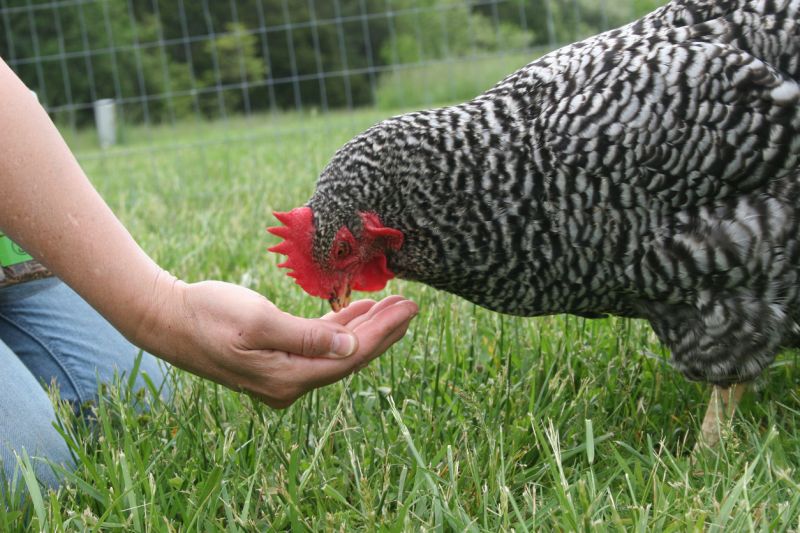
If these unique chickens sound like ideal birds for you, then it’s important to look into their care before bringing them home. Here are some tips for what to feed them and where to keep them.
Feeding
Barred Rock chicks need to start with a feed that has 18% protein. Chicks need a lot of protein to thrive because they grow at such a rapid pace. If they don’t get enough protein, they might have health concerns as adults. For additional protein, you can give them treats like dried shrimp and mealworms.
As chicks age, you can transition them to an adult feed with less protein. A 16% layer feed for adults is ideal. To help them produce healthier eggs, you should give them oyster shells or another calcium supplement with their food. Roosters do not need added calcium like hens do.
Most feeds have enough nutrients to satisfy a Barred Rock’s diet. They don’t need to each much to produce healthy eggs. However, providing them with free range time can help them find more nutrients. They might snack on items like weeds and bugs, which can keep your land clean while also adding to their nutrition.
It’s a good idea to only leave the feed sitting out for a certain amount of time each day. Leaving chicken feed out 24/7 may attract pests.
Habitat Setup
Barred Rocks are large chickens that love having room to roam. Each bird should have a minimum of 10 square feet of coop space. You can give them free range time to prevent them from getting bored, but it’s best to secure their enclosure at night to protect them from predators.
These hens lay a lot of eggs, so you should also provide them with nesting boxes. The standard nesting box for these birds is 12 inches wide, tall, and deep. That way, it’ll be big enough for a chicken to rest comfortably in it without other chickens squeezing their way in. Crowded nesting boxes could result in broken eggs.
Roosting perches are also essential for any domesticated chicken. There should be enough perches for all your chickens to comfortably spread out if needed. Putting the perches at varying heights is a good way to prevent chickens from flying away in search of a higher perch.
Temperature
Barred Rocks are one of the best chicken breeds for living in cold temperatures. They can tolerate winter months well, and they may even lay eggs when it’s cold. Even so, they should still have plenty of adequate shelter year-round.
While these chickens can also tolerate warm weather, they prefer the cold. So, to keep them safe in the summer, provide plenty of shade and water. Make sure their coop is well ventilated to prevent them from overheating.
Health Concerns
For the most part, this is a healthy breed. They live longer than most chicken breeds, reaching 10 to 12 years old. They don’t have many common health concerns. The most likely issue you’ll run into is parasites like lice, mites, and worms.
Keeping your chicken coop clean is the key to avoiding parasites. Replace their bedding regularly and make sure they always have fresh food and water. If a chicken in your flock still gets parasites in your enclosure, take them to the vet right away since most of those pests can spread quickly. You may need to isolate an infected chicken to keep the other birds safe.
If you’re looking for ways to boost your chickens’ health, then consider adding herbs like oregano and lemon balm to their diets to boost their immune systems. With a clean coop and a strong immune system, your chicken will be less likely to face common diseases like fowl pox and coccidiosis.
Breeding Barred Rock Chickens
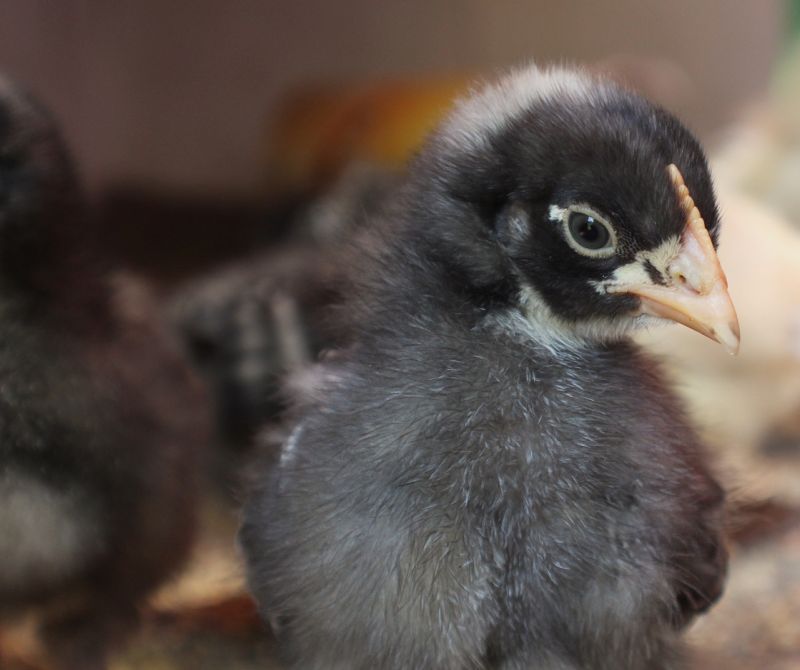
Like most chicken breeds, these birds will breed on their own, as long as you have a rooster with the hens. Getting a rooster is a great way to hatch and raise more chickens to add to your flock. Chicken breeding might seem a little rough and intense, but it’s a natural way to bring more of these unique birds into this world.
If you only want to raise these chickens for edible eggs, then you don’t need a rooster at all. Hens will continuously lay infertile eggs that you can eat or sell. So, only keep roosters with your hens if you want more chicks.
Egg Production
Barred Rock hens usually lay about 4 eggs per week. They can lay 200 to 280 eggs annually. One of the best parts of their egg laying capabilities is that they usually lay year-round while other chicken breeds stop laying for the winter. So, these chickens are more commonly used for eggs instead of meat.
These hens lay eggs very consistently until they’re three years old. Then, their egg production may slowly decline. Most of these birds can keep laying eggs until they’re about 10 years old, which is older than most chicken even live to be.
Frequently Asked Questions
If you’re considering keeping this chicken breed, you might have some lingering questions. So, here’s more information about these majestic birds.
At What Age Do Barred Rocks Start Laying Eggs?
This Barred Rock breed usually starts laying eggs at 16 to 20 weeks old. Once a hen starts laying, they’ll usually produce one egg every 25 hours or so. However, these chickens might not lay eggs when it gets cold outside, but most do.
Do Barred Rock Chickens Like to Be Held?
Yes, Barred Plymouth Rocks can enjoy being held, but it depends. They’re usually friendliest and most tolerant around the humans they know well. Once you bond with one of these chickens, they may enjoy sitting on your lap or being picked up.
Are Barred Rock Roosters Aggressive?
No, these roosters aren’t usually aggressive. They’re typically docile and friendly like the hens. However, roosters of most chicken breeds are usually more likely to be aggressive and territorial than hens. So, it’s best to only have a few roosters in your flock if any.
Are Barred Rock Chickens Right for You?
If you’re looking for a chicken that’s great for meat, eggs, or even as a pet, then Barred Rock chickens are great for you. They have so many purposes, making them one of the most adaptable chickens out there.
Not only are Barred Rocks beautiful and practical, but they’re also affordable. You can buy them as chicks for less than $3 each. Since they lay eggs year-round, you can earn extra money from selling eggs too.
Barred Rocks are definitely one of the most versatile breeds out there, but they’re not the only great option. There are plenty of other efficient egg-laying chickens that you should also consider.